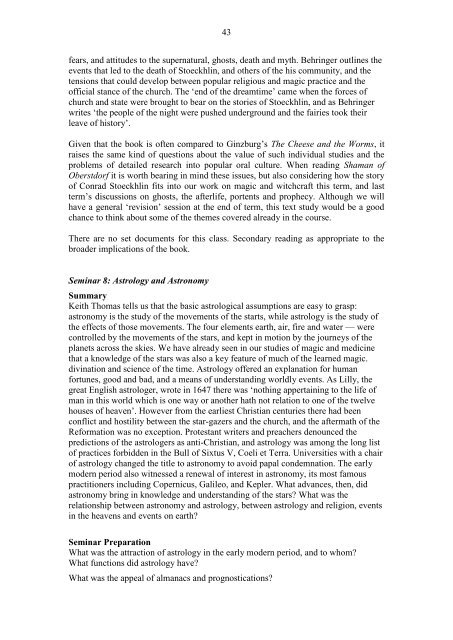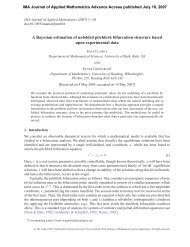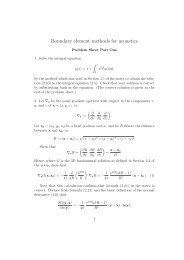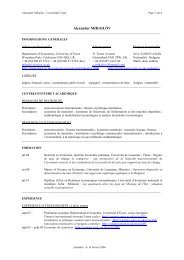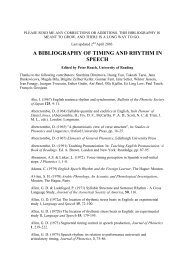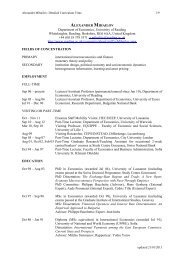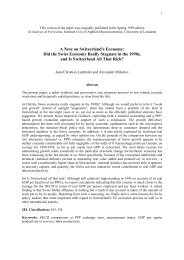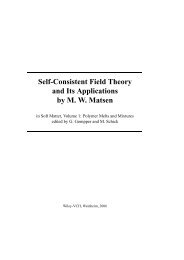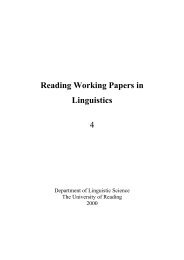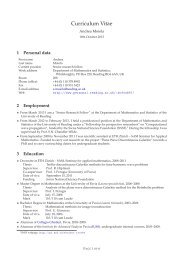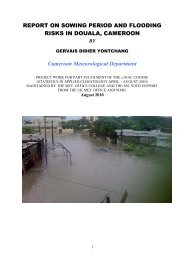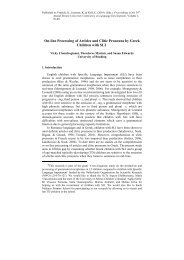Ritual, Myth and Magic in Early Modern Europe - University of Reading
Ritual, Myth and Magic in Early Modern Europe - University of Reading
Ritual, Myth and Magic in Early Modern Europe - University of Reading
You also want an ePaper? Increase the reach of your titles
YUMPU automatically turns print PDFs into web optimized ePapers that Google loves.
43<br />
fears, <strong>and</strong> attitudes to the supernatural, ghosts, death <strong>and</strong> myth. Behr<strong>in</strong>ger outl<strong>in</strong>es the<br />
events that led to the death <strong>of</strong> Stoeckhl<strong>in</strong>, <strong>and</strong> others <strong>of</strong> the his community, <strong>and</strong> the<br />
tensions that could develop between popular religious <strong>and</strong> magic practice <strong>and</strong> the<br />
<strong>of</strong>ficial stance <strong>of</strong> the church. The ‗end <strong>of</strong> the dreamtime‘ came when the forces <strong>of</strong><br />
church <strong>and</strong> state were brought to bear on the stories <strong>of</strong> Stoeckhl<strong>in</strong>, <strong>and</strong> as Behr<strong>in</strong>ger<br />
writes ‗the people <strong>of</strong> the night were pushed underground <strong>and</strong> the fairies took their<br />
leave <strong>of</strong> history‘.<br />
Given that the book is <strong>of</strong>ten compared to G<strong>in</strong>zburg‘s The Cheese <strong>and</strong> the Worms, it<br />
raises the same k<strong>in</strong>d <strong>of</strong> questions about the value <strong>of</strong> such <strong>in</strong>dividual studies <strong>and</strong> the<br />
problems <strong>of</strong> detailed research <strong>in</strong>to popular oral culture. When read<strong>in</strong>g Shaman <strong>of</strong><br />
Oberstdorf it is worth bear<strong>in</strong>g <strong>in</strong> m<strong>in</strong>d these issues, but also consider<strong>in</strong>g how the story<br />
<strong>of</strong> Conrad Stoeckhl<strong>in</strong> fits <strong>in</strong>to our work on magic <strong>and</strong> witchcraft this term, <strong>and</strong> last<br />
term‘s discussions on ghosts, the afterlife, portents <strong>and</strong> prophecy. Although we will<br />
have a general ‗revision‘ session at the end <strong>of</strong> term, this text study would be a good<br />
chance to th<strong>in</strong>k about some <strong>of</strong> the themes covered already <strong>in</strong> the course.<br />
There are no set documents for this class. Secondary read<strong>in</strong>g as appropriate to the<br />
broader implications <strong>of</strong> the book.<br />
Sem<strong>in</strong>ar 8: Astrology <strong>and</strong> Astronomy<br />
Summary<br />
Keith Thomas tells us that the basic astrological assumptions are easy to grasp:<br />
astronomy is the study <strong>of</strong> the movements <strong>of</strong> the starts, while astrology is the study <strong>of</strong><br />
the effects <strong>of</strong> those movements. The four elements earth, air, fire <strong>and</strong> water — were<br />
controlled by the movements <strong>of</strong> the stars, <strong>and</strong> kept <strong>in</strong> motion by the journeys <strong>of</strong> the<br />
planets across the skies. We have already seen <strong>in</strong> our studies <strong>of</strong> magic <strong>and</strong> medic<strong>in</strong>e<br />
that a knowledge <strong>of</strong> the stars was also a key feature <strong>of</strong> much <strong>of</strong> the learned magic.<br />
div<strong>in</strong>ation <strong>and</strong> science <strong>of</strong> the time. Astrology <strong>of</strong>fered an explanation for human<br />
fortunes, good <strong>and</strong> bad, <strong>and</strong> a means <strong>of</strong> underst<strong>and</strong><strong>in</strong>g worldly events. As Lilly, the<br />
great English astrologer, wrote <strong>in</strong> 1647 there was ‗noth<strong>in</strong>g apperta<strong>in</strong><strong>in</strong>g to the life <strong>of</strong><br />
man <strong>in</strong> this world which is one way or another hath not relation to one <strong>of</strong> the twelve<br />
houses <strong>of</strong> heaven‘. However from the earliest Christian centuries there had been<br />
conflict <strong>and</strong> hostility between the star-gazers <strong>and</strong> the church, <strong>and</strong> the aftermath <strong>of</strong> the<br />
Reformation was no exception. Protestant writers <strong>and</strong> preachers denounced the<br />
predictions <strong>of</strong> the astrologers as anti-Christian, <strong>and</strong> astrology was among the long list<br />
<strong>of</strong> practices forbidden <strong>in</strong> the Bull <strong>of</strong> Sixtus V, Coeli et Terra. Universities with a chair<br />
<strong>of</strong> astrology changed the title to astronomy to avoid papal condemnation. The early<br />
modern period also witnessed a renewal <strong>of</strong> <strong>in</strong>terest <strong>in</strong> astronomy, its most famous<br />
practitioners <strong>in</strong>clud<strong>in</strong>g Copernicus, Galileo, <strong>and</strong> Kepler. What advances, then, did<br />
astronomy br<strong>in</strong>g <strong>in</strong> knowledge <strong>and</strong> underst<strong>and</strong><strong>in</strong>g <strong>of</strong> the stars? What was the<br />
relationship between astronomy <strong>and</strong> astrology, between astrology <strong>and</strong> religion, events<br />
<strong>in</strong> the heavens <strong>and</strong> events on earth?<br />
Sem<strong>in</strong>ar Preparation<br />
What was the attraction <strong>of</strong> astrology <strong>in</strong> the early modern period, <strong>and</strong> to whom?<br />
What functions did astrology have?<br />
What was the appeal <strong>of</strong> almanacs <strong>and</strong> prognostications?


